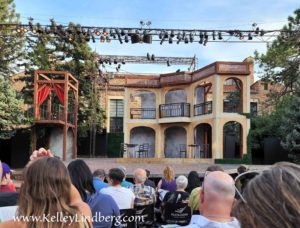
Lighting, of course, is an essential part of any stage performance. Usually, the lighting is planned and provided by the play’s director and stage crew. Last week, at a performance at the Colorado Shakespeare Festival, something else was at hand.
I’d gone with a friend to see of The Two Gentlemen of Verona on the Colorado University campus in Boulder. It was to be performed at their outdoor theatre, which is nestled in between century-old red-stone buildings.
The weather report said there would be a chance of thunderstorms. We packed rain jackets and a water-proof blanket.
The play is one of Shakespeare’s comedic romances, full of star-crossed lovers and gender-bending disguises. (What? You thought our generation invented those?) At intermission, a few random raindrops fell on us as we stood to stretch our legs, but the clouds weren’t gloomy or roiling, and the drops felt—dare I say it?—welcome on an exceptionally warm evening.

The second half of the play began, the scattered raindrops vanished, and we were once more absorbed into the terrible trials of Julia, who watches her beloved Proteus fall for another woman. We worried as Proteus betrays not only his Julia, but his dearest friend Valentine. We forgot about the heat, and the raindrops, and the blackening sky as we lost ourselves in the impending disasters of the story.
Then, as the emotions ran hard and dark on stage, the lightning in the heavens began.
Lightning storms in the West can be epic to behold. The bolts flicker continuously, with no more than a second or two between them. The sky glows and sparks and boils with lightning—sometimes lighting up the inside of the clouds like a lightbulb under scarves, other times tearing through the clouds in naked, raw bolts.
As Proteus writhed on the stage in his agony, the sky flashed incessantly above him, the thunder a low, continuous rumble—soft enough not to drown out the actor’s words, just loud enough to hint at menace.
The storm remained that way for the last ten or fifteen minutes of the play—no rain, all dry threat and resonating passion.
And then the play was over. The actors took their final bow, a bit hurriedly.
We in the audience quickly collected our belongings, headed for the parking lot.
And the sky finally let loose its burden of pent-up rain.
By the time we reached our car, we were soaked. We could barely see as the rain poured off our hoods and umbrellas. Cars on the streets were already kicking up fans of water as they splashed through the torrent.
Had the storm opened up five minutes earlier, it would have utterly demolished the final moments of the play.
We drove through monsoon rains and small hail for more than twenty miles. Then, for another forty miles, the rain mostly ceased, but the entire sky, from horizon to horizon, still played its light show. When I finally made it home, I stood on the deck and watched the lightning continue to rip and roll across a hundred miles of sky.
I can’t help but think the storm over the stage that night was conjured not by temperature and high-pressure systems. It was too large, too fierce, too tied to the play’s final scenes.
No. I think perhaps Shakespeare himself, cloaked in Prospero’s robes, was the author of that storm.
[Lightning photo by Felix Mittermeier on Unsplash. Stage photo by Kelley J. P. Lindberg]


Leave a Reply